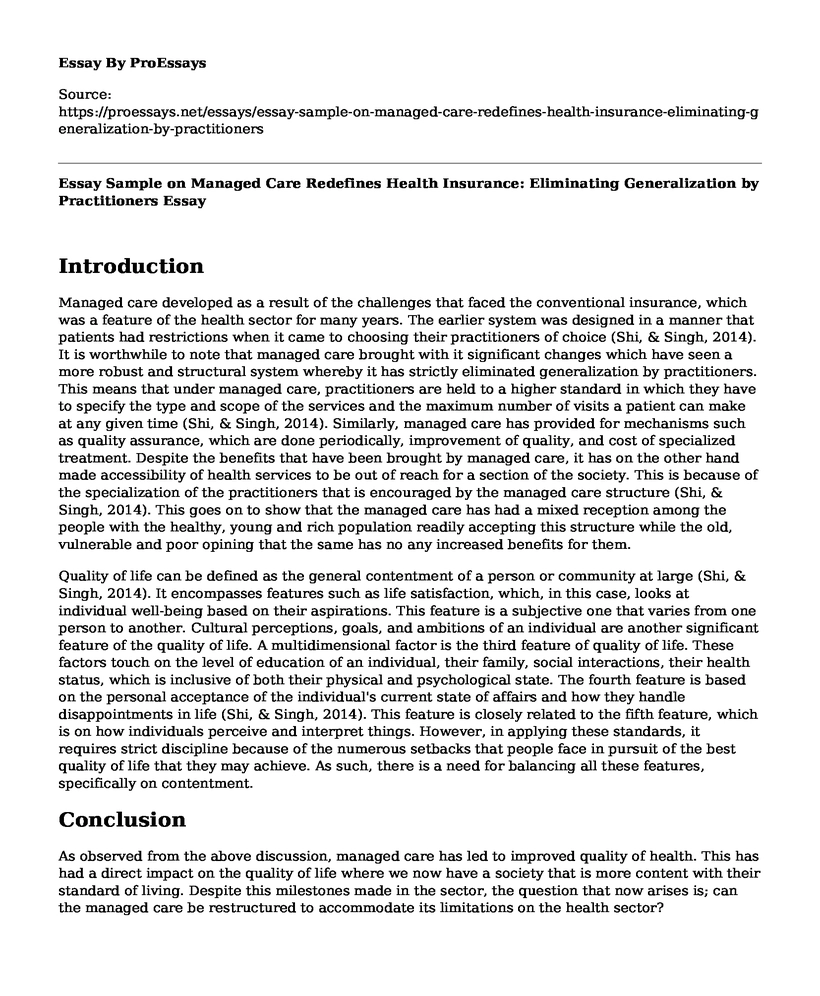Introduction
Managed care developed as a result of the challenges that faced the conventional insurance, which was a feature of the health sector for many years. The earlier system was designed in a manner that patients had restrictions when it came to choosing their practitioners of choice (Shi, & Singh, 2014). It is worthwhile to note that managed care brought with it significant changes which have seen a more robust and structural system whereby it has strictly eliminated generalization by practitioners. This means that under managed care, practitioners are held to a higher standard in which they have to specify the type and scope of the services and the maximum number of visits a patient can make at any given time (Shi, & Singh, 2014). Similarly, managed care has provided for mechanisms such as quality assurance, which are done periodically, improvement of quality, and cost of specialized treatment. Despite the benefits that have been brought by managed care, it has on the other hand made accessibility of health services to be out of reach for a section of the society. This is because of the specialization of the practitioners that is encouraged by the managed care structure (Shi, & Singh, 2014). This goes on to show that the managed care has had a mixed reception among the people with the healthy, young and rich population readily accepting this structure while the old, vulnerable and poor opining that the same has no any increased benefits for them.
Quality of life can be defined as the general contentment of a person or community at large (Shi, & Singh, 2014). It encompasses features such as life satisfaction, which, in this case, looks at individual well-being based on their aspirations. This feature is a subjective one that varies from one person to another. Cultural perceptions, goals, and ambitions of an individual are another significant feature of the quality of life. A multidimensional factor is the third feature of quality of life. These factors touch on the level of education of an individual, their family, social interactions, their health status, which is inclusive of both their physical and psychological state. The fourth feature is based on the personal acceptance of the individual's current state of affairs and how they handle disappointments in life (Shi, & Singh, 2014). This feature is closely related to the fifth feature, which is on how individuals perceive and interpret things. However, in applying these standards, it requires strict discipline because of the numerous setbacks that people face in pursuit of the best quality of life that they may achieve. As such, there is a need for balancing all these features, specifically on contentment.
Conclusion
As observed from the above discussion, managed care has led to improved quality of health. This has had a direct impact on the quality of life where we now have a society that is more content with their standard of living. Despite this milestones made in the sector, the question that now arises is; can the managed care be restructured to accommodate its limitations on the health sector?
References
Shi, L., & Singh, D. A. (2014). Delivering health care in America. Jones & Barlett Learning.
Cite this page
Essay Sample on Managed Care Redefines Health Insurance: Eliminating Generalization by Practitioners. (2023, May 22). Retrieved from https://proessays.net/essays/essay-sample-on-managed-care-redefines-health-insurance-eliminating-generalization-by-practitioners
If you are the original author of this essay and no longer wish to have it published on the ProEssays website, please click below to request its removal:
- The Societal Impact on Fibromyalgia Patients
- Essay Sample on Technologies in Healthcare
- Acquisition of Healthy Habits Paper Example
- Essay Sample on Teenage Pregnancy: A Journey of Pain, Anger and Resentment
- Essay on Estonia Protects People With Disabilities: Challenges and Opportunities
- Essay Sample on COVID-19 Pandemic: Causes, Clinical Presentations & Impact
- Free Essay Sample on Understanding Social Determinants & Cultural Awareness in Healthcare







